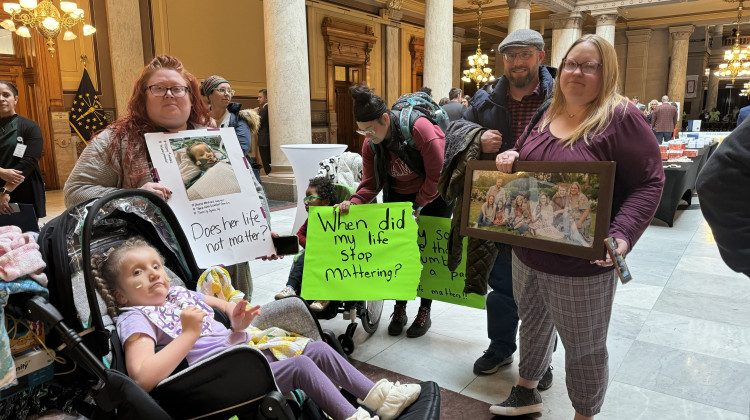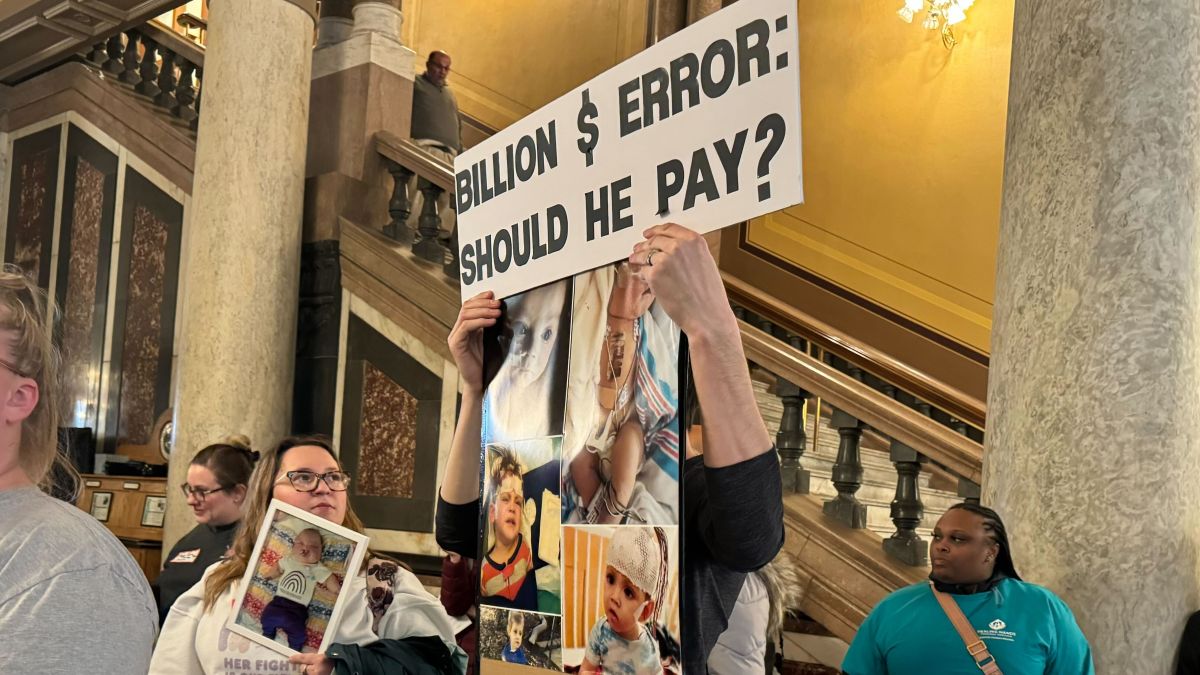
Protesters gathered at the Indiana Statehouse on Jan. 22, 2024 to rally against proposed changes to Medicaid. To plug a budget gap, the state is proposing to end payments to legally responsible individuals who care for family members with disabilities.
Elizabeth Gabriel/WFYI NewsThis story was updated on Jan. 23.
More than 50 adults and children gathered at the Indiana Statehouse on Monday to rally against proposed changes to the Aged and Disabled Waiver.
A proposal by the Family and Social Services Administration would eliminate payments to legally responsible individuals, who care for disabled family members instead of a certified nurse.
The funds help families who haven’t been able to find professional home health aides and end up taking on those responsibilities themselves, forgoing full time employment.
“The long term effect of this, I just don’t see it being a money-saver,” said Tendra Duff, the organizer of the protest and a mother of twin boys with Down Syndrome. “We’re going to probably have more hospital admissions, there’s going to be people bringing sicknesses into my house and not even maybe being trained to do what’s appropriate and proper for my kiddos.”
The payments has allowed older adults and people with disabilities, including infants and children, to remain in their home instead of relying on outside caregivers or going to a nursing facility.
But when the federal public health emergency expired last spring, some pandemic-era waivers and flexibilities were set to be rolled back. However, advocates say the FSSA said those payments through the Aged and Disabled Waiver were not on the chopping block.
But several months later that changed after state lawmakers realized they had a budget deficit of more than $900 million.

Parents and advocates worry that as the state scrambles to plug this budgetary gap, it will take away a lifeline that some of the most vulnerable families rely on.
It can be difficult to find nurses willing to work for medically-complex patients, especially outside of large cities. The COVID-19 pandemic also exacerbated a national nursing shortage making it even harder to find a caregiver. Some parents often missed work or left their jobs in order to care for their family member with a disability.
Jaime Oneal’s nearly 3-year-old son, Colson, is the youngest of her three kids. He has epilepsy, cerebral palsy and cortical visual impairment. She often missed 15-20 hours of work every week to accommodate for Colson’s therapy and doctors appointments.
“I was drowning in work,” Oneal said. “I could not keep up with my job and my home life either. I was missing things at work, or one of my kids would have to miss a doctor's appointment or Colson would have to miss therapy because I just couldn't keep up with it all.”
Her family began receiving these funds in March 2023 and it helped them support their child who can’t talk, walk or eat independently.
The payments allowed families of people with disabilities to get back on their feet, while their disabled family members were cared for.
On Jan. 17, the state announced a number of potential changes to the state’s Medicaid program, including changes to the A&D Waiver and not allowing any more legally responsible individuals to enroll as caregivers to receive payments starting January 2024.The suggested changes aim to save the state $300 million annually, according to the FSSA.
If approved, the changes will take effect July 2024.
The state says they will work with families to help them transition to new care before then. But parents and advocates are skeptical FSSA will be able to find enough providers to serve everyone.
The Arc of Indiana is part of a national organization that provides resources and advocacy for people with intellectual and developmental disabilities. Karly Sciortino-Poulter, director of the group’s statewide advocacy programs, said she’s concerned parents will have to go back to work and leave their family members with disabilities without care.
“If people aren't getting the supports that they need, their health starts deteriorating,” Sciortino-Poulter said. “They start having worse health outcomes and they go in and out of the hospital a lot more.”
If families are unable to find a nurse, they may be forced to continue providing hospital-level care, but without the salary. Advocates say families would risk major financial pitfalls, such as going back on food stamps or even losing their housing.
Oneal said these changes would “drastically affect” her family’s life.
“We're going to lose our vehicle, we may have to move to a place we can afford a little better,” Oneal said.
She has since started a petition against the proposed changes, which has gained nearly 10,000 signatures in less than a week.
The proposed changes are open for public comment Jan. 17 through Feb. 16, 2024.
Public comment can be submitted via email at DDRSwaivernoticecomment@fssa.IN.gov or mail at FSSA Division of Disabilities and Rehabilitative Services P.O. Box 7083, Indianapolis, IN 46027.
CORRECTION: The story previously implied that parents were only able to get paid since the COVID-19 pandemic. This is inaccurate. Parents were able to be paid through the Aged and Disabled Waiver before the COVID-19 pandemic. The story also previously mentioned the A&D Waiver is ending. This was also inaccurate. The proposed changes by the FSSA will only end the option for parents to be paid for providing attendant care.
Contact WFYI’s health reporter Elizabeth Gabriel at egabriel@wfyi.org.
 DONATE
DONATE






 Support WFYI. We can't do it without you.
Support WFYI. We can't do it without you.